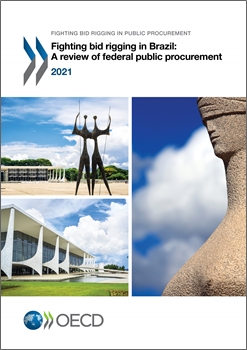Concurrence
Fighting bid rigging in Brazil: A review of federal public procurement
Português
|
DATE OF PUBLICATION: |
Download the report: English l PortugueseRead the highlights brochure: English l Portuguese
Public procurement plays a strategic role in a country’s economy, and the quality of services that the government provides to its citizens. In 2020, Brazil spent around BRL 35.5 billion in the procurement of goods, services and works. In 2017, public procurement represented around 13.5% of Brazil’s total government expenditures and approximately 6.5% of the country’s GDP. Due to the size of the involved financial flows, public procurement is exposed to risks of collusion among suppliers as well as fraud and corruption. In Brazil, bid rigging is an administrative and a criminal offence and has long been an enforcement priority for the Brazilian Competition Authority, CADE. Against this background, Brazil has invited the OECD to assess the Brazilian public procurement framework in light of the OECD Recommendation and the Guidelines for Fighting Bid Rigging in Public Procurement. The report shows that Brazil’s federal procurement regime acknowledges and attempts to limit bid-rigging risks. Brazilian enforcement authorities have actively prosecuted and punished bid rigging. However, further efforts to make federal procurement more competitive would be useful, and the report proposes ways of achieving this objective. The report was launched virtually on 19 May 2021. |
|
Brazil’s competition authority (CADE) has invited the OECD to assess the Brazilian public procurement framework in light of the OECD Recommendation and the Guidelines for Fighting Bid Rigging in Public Procurement. During the process, the OECD assessed the main rules governing public procurement in Brazil at the federal level as well as procurement practices of major federal procurers. The OECD’s assessment was presented in a report including recommendations to improve competition in public procurement and an accompanying highlights brochure. As part of the project, the OECD also:
Background Bid rigging in public tenders involves firms conspiring to raise prices or lower the quality of their bid. It is an illegal anti-competitive practice which costs governments and taxpayers billions of dollars every year across the world. A significant share of cartel enforcement in many OECD countries concerns bids rigging cases. This shows that there is awareness of the importance of stopping collusive practices, but also that there is room to improve compliance with competition rules in public procurement and ensure that the public sector buys the right thing, at the right price. The OECD Recommendation and the Guidelines for Fighting Bid Rigging in Public Procurement were designed to reduce the risks of bid rigging through careful design of the procurement process and to help detect bid rigging conspiracies. |
|
|
||||||||||||
Fighting Bid Rigging in Public Procurement
More OECD competition work on Brazil
Mexico-OECD partnership for fighting bid rigging in government contracts
Competition in Latin America
Latin American and Caribbean Competition Forum
OECD competition home page
Documents connexes
